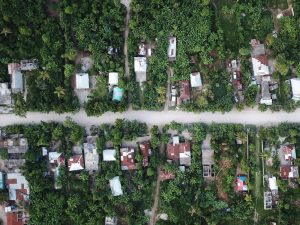Breaking Out of the 9-to-5
Anyone who has spent any time on the Internet consuming content pertaining to travel has likely seen content created by digital nomads. Searching the term ‘digital nomad’ on platforms such as Instagram, TikTok or YouTube reveals hours of content documenting professionals who eschew a traditional 9-to-5 office job, affirm a passion for travel, take a job remotely, and move to a new environment for days, weeks, or even months at a time. The concept has garnered enough legitimacy to warrant it entering some English-language dictionaries, such as Merriam-Webster, which defines a ‘digital nomad’ as ‘someone who performs their occupation entirely over the Internet while [travelling]’. The allure of working remotely by a sun-kissed beach or in a café in Rome has inspired many in recent years to acquire this lifestyle and broadcast their experiences online.
Given the nature of employment and migration, it is difficult to quantify precisely how many people may qualify as digital nomads. Regardless, as the COVID-19 pandemic unraveled, it became clear that the socioeconomic sway held by the digital-nomadic phenomenon must not be underestimated. This is especially clear when investigating the legal recognition of digital nomads in many jurisdictions from the beginning of the pandemic onwards. What were the circumstances that led to the legal recognition of digital nomads around the world at the onset of the COVID-19 pandemic, and what are the impacts of such legal recognition for the host communities?
Enter Digital Nomad Visa Schemes… During a Pandemic
From the onset of the COVID-19 pandemic, several countries outright restricted international tourism, which severely limited the flow of money that comes with it. To offset this trend, many jurisdictions either implemented digital nomad visa schemes or altered their immigration infrastructure to facilitate remote work for foreigners. Some of the earliest examples of jurisdictions proposing such amendments include Dubai, Iceland and Bermuda. These new visa schemes continued once pandemic restrictions started lifting around the world, with Italy, Portugal and Mauritius implementing them as well.
Legal recognition for digital nomads was meant to entice people otherwise unfamiliar with the world of digital nomads –i.e. to those who normally worked in-person, but who, during work-from-home orders, could work remotely abroad for an extended period of time- to become migrants themselves. The legal recognition of digital nomads during the global pandemic shows the financial role played by tourists and temporary migrants in their host countries, and represents an attempt to recuperate whatever funds that may have otherwise been lost from the restriction of migration.
Economic Migration in the Digital Age
The growing popularity of telework is symptomatic of how technology has become so ingrained in contemporary life, especially during the COVID-19 pandemic. The legal recognition of digital nomads can be considered a step towards both migratory and economic liberalization so as to provide protections for this class of migrants that have blossomed in recent years.
Incidentally, by introducing visas and policies specific to digital nomads, jurisdictions are now able to propose statistics estimating how many migrants declare themselves as digital nomads (and thus as longer-term, yet still temporary residents), collect taxes from them, and allocate their access to certain public services.
However, the legalization of digital nomads may also be interpreted as an effort to regulate their presence in jurisdictions where they have garnered ample criticism. Concerns have been raised regarding the gentrification of communities [1] by wealthier temporary residents who collectively, and in some cases, profoundly reconfigure their host community’s socioeconomic landscape in economies already facing hardships in relation to the pandemic. Given the inherently online orientation of their work, digital nomads have long been able to pose as tourists when working abroad, because their work would assumedly be no more conspicuous than using a laptop in a public setting. But not everyone is as likely to become a digital nomad. As Dave Cook argues, the holders of ‘stronger passports’ are more likely to have the ability to work as digital nomads and to present themselves as legal tourists instead of workers to their host countries, thus bypassing further documentation and recognition as authorized workers.
The legal recognition of digital nomads thus needs to also be considered as a means of addressing other socioeconomic issues— issues that have been exacerbated by both the pandemic and the very influx of digital nomads. Portugal, one of the countries that has recently introduced a digital nomad visa, grappled with protests against the digital nomad phenomenon during the 2022 Web Summit. Looking at Portugal’s ‘golden visa scheme’, which facilitated immigration for those who invested large sums of money in the country, Pieter Haeck and Gian Volpicelli uncovered widespread concerns that the influx of digital nomads has led to a dramatic expansion of Airbnb and thus precarious housing arrangements for many local residents. Similar backlashes against digital nomads also occurred in Mexico, Colombia and Indonesia, as locals feared they contributed to rising inflation and neighborhood gentrification.
Are digital nomads here to stay?
Many factors contributed to the legal recognition of digital nomads around the world, including the financial pressures generated by the COVID-19 pandemic. As international mobility is slowly returning to the pre-pandemic level, digital nomad visa schemes have continued to proliferate, despite growing criticisms that they contribute to socioeconomic problems already exacerbated by the pandemic, notably local people’s access to housing. Such tensions may be assuaged by providing digital nomads a new legal status that regulates their work and taxes them, though the efficacy of these policies would need to be monitored in the years to come. Given the evident rise in interest in the digital nomad phenomenon, policymakers will need to consider where both locals and digital nomads fit into public policy decisions for institutions like housing, employment and social services.
Add hyperlink/reference











